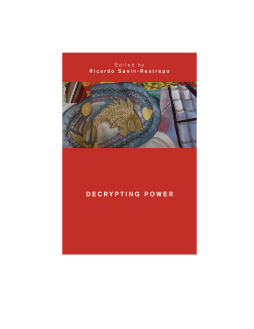
Additional Information
Book Details
Abstract
Decrypting Power aims to reach a unifying concept that allows the connection of the fundamental theses stemming from critical legal studies, Subaltern studies, decolonization, law and society, global political economy, critical geopolitics and theories of de-coloniality. This volume proposes that this concept is the ‘encryption of power’, a category of analysis that reveals the weakness of political liberalism when it takes the place of the legitimate fundament of democracy, as well as its consummate capacity to conceal new mechanisms of global power.
The theory of encryption of power understands that there is only a world where difference exists as the fundamental and sole order, but also that such a possibility is heavily obstructed by the concentration of power in forms of oppression. The world hangs on the thread of this entangled reality, made up of difference and its denial, of democracy and its simulations, of truth and its codifications. The decryption of power is then, above all, a theory of justice essential to radical democracy, which comes fully-equipped to prevail over the conditions that deny the possibility of an egalitarian world.
Decrypting Power offers a series of excellent articles on one of the most perplexing concepts that has plagued the left for centuries. From theory to practice, the word power almost always appears in slogans, tracts, and theoretical work. But what is a leftist notion of power? What does it mean to seize power? What does it mean to hold power? How do we distinguish power from force? In these illuminating essays these difficult questions are addressed. The essays are powerfully argued and well written and they are a must read for anyone who takes seriously what it would mean for the left to be in power, whether in the form of the state or other kinds of organization, such as transnational federations or continental communities. Sanín-Restrepo has provided us with a much needed service and we are in his debt.
Drucilla Cornell, Professor of Political Science, Comparative Literature, and Women and Gender Studies, Rutgers University
Ricardo Sanín-Restrepo is a member of the Caribbean Philosophical Association and a professor of legal and political theory at several institutions across Latin America, including Universidad Autónoma de Mexico (UNAM), Universidad Central de Quito, Universidad San Luis de Potosí (Mexico), PUC Rio de Janeiro, and Universidad Javeriana in Colombia, among others. He is the author of Decolonizing Democracy (RLI, 2016).
One of the most problematic aspects of critique these days is a fantasy about politics without power. This collection of powerful essays tackles the issue head on. What does it mean for progressive forces and the left to be in power? Power is not some ready-at-hand thing, a mere tool which can be wielded one way or another by progressives and reactionaries. Power institutions not only have a language of their own, but also a code. To participate in them is to engage with both. But if the left is to be in power, as it must, then it must also be ready to hack current institutional technologies, decrypt their code, and harness their performative force in new ceremonials and utopian technologies. Sanín-Restrepo has gifted us with the concepts to do so.
Oscar Guardiola-Rivera, Reader in Law and Political Philosophy, Birkbeck College, University of London
Table of Contents
| Section Title | Page | Action | Price |
|---|---|---|---|
| Contents | 7 | ||
| I: Introduction | 9 | ||
| Introduction | 11 | ||
| 1 The Encrypted Constitution | 33 | ||
| II: Encryption Law and Power | 57 | ||
| 2 The Equivocation that Lies Like Truth | 59 | ||
| 3 Encrypted International Investment Law | 81 | ||
| 4 The Emergence of a Transnational Legal Pluralism as an Expression of Hegemonic Globalization | 99 | ||
| III: The Political Subject | 127 | ||
| 5 The Practices of the Commons between Decryption and Insurgent Critique | 129 | ||
| 6 Encryption within Prohibition | 145 | ||
| 7 The Symbolic Force and the Encryption of Gender in Law | 161 | ||
| IV: Encryption, Political Theory, and Language | 187 | ||
| 8 Metaphors of Decryption | 189 | ||
| 9 The People vs. Hegel | 211 | ||
| V: Decryption and Political Action | 243 | ||
| 10 Hypothesis for Decrypting Power | 245 | ||
| 11 Decrypting the Constitution through the Grounding of Human Rights | 271 | ||
| 12 The Field of Popular Power and Transformative Constitutionalism in Venezuela | 297 | ||
| 13 Decrypting Global Capitalism | 325 | ||
| Index | 351 |
